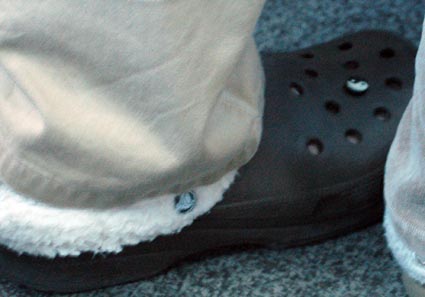It’s fascinating how most successful products lead to an ecosystem of supporting products. The Crocs fad has provided the fan-base to support charms, little decorations that attach to the holes on the shoe’s surface and let the wearer further establish their individual identity within the trend of people who have established a unique identity by wearing Crocs in the first place.
Acknowledging that following a trend has a very different meaning in Japan, we bring you the Crocs family, who we saw on a bus in Kyoto, each with their own charms.

Dad

Mom

Son

Baby
In addition to aftermarket personalization, many trends also generate a safety backlash meme (iPod muggings, anyone?). In Taipei, it’s dangerous to wear Crocs on escalators.

Manufacturers like Apple are very savvy about creating/controlling their aftermarket, but I wonder about the backlashes. Are PR people planting those stories or doing damage control or not realizing their significance?
Update: Karl Long on the Crocs backlash (safety and others) here





